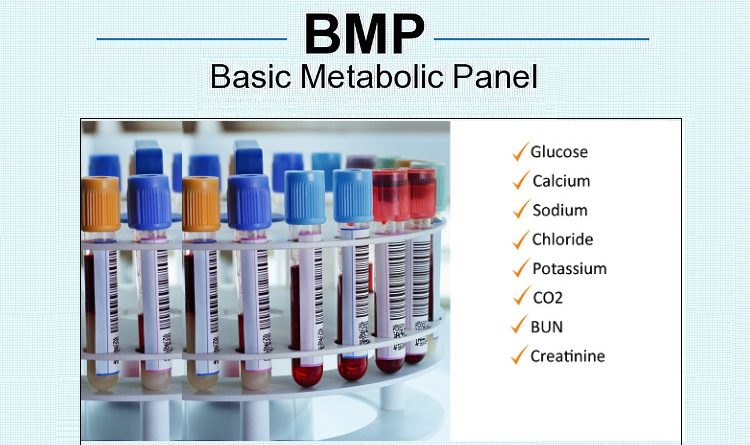What is Basic Metabolic Panel (BMP)?
Last Updated on 02/09/2026 by Helal Medical
A Basic Metabolic Panel (BMP) is a group of seven to eight blood tests that measure the levels of different substances in the body. The purpose of the BMP is to evaluate the health of the kidneys, electrolyte and acid-base balance, and blood glucose levels. The test provides critical information about the functioning of several organs and systems, and helps to detect potential issues early, before they become more serious.
Basic Metabolic Panel includes the following tests:
- Sodium: This test measures the levels of sodium in the blood, which helps to regulate fluid balance in the body.
- Potassium: This test measures the levels of potassium in the blood, which helps to regulate the heart rate and muscle function.
- Chloride: This test measures the levels of chloride in the blood, which helps to maintain the proper balance of fluids in the body.
- Bicarbonate: This test measures the levels of bicarbonate in the blood, which helps to regulate the pH balance of the body.
- Blood Urea Nitrogen (BUN): This test measures the levels of nitrogen-containing waste products in the blood, which are produced by the kidneys and liver.
- Creatinine: This test measures the levels of creatinine in the blood, which is produced by the muscles and eliminated by the kidneys.
- Glucose: This test measures the levels of glucose (sugar) in the blood, which is the primary source of energy for the body.
- Calcium: This test measures the levels of calcium in the blood, which is essential for strong bones, normal blood clotting, and nerve and muscle function.
The results of the BMP are usually available within a few hours, and they are interpreted by a healthcare professional, such as a doctor or nurse. If the results show any abnormal levels, additional tests may be ordered to determine the cause of the issue.
What is Basic Metabolic Panel used for?
The BMP is a valuable tool for monitoring the overall health of an individual, and it is often used as part of a routine health checkup, or as a screening test for certain medical conditions. For example, it may be used to monitor the function of the kidneys in individuals with diabetes, or to assess the electrolyte and acid-base balance in individuals with heart disease. Here is some conditions, where BMP is used to assess:
- Kidney function
- Fluid and electrolyte balance
- Blood sugar levels
- Acid and base balance
- Metabolism
Interpretation of the BMB tests
The interpretation of the results from a Basic Metabolic Panel (BMP) depends on various factors such as age, gender, health status, and the reference range used by the laboratory. The reference range is a range of values that is considered normal for a given population. Here are some general guidelines for interpreting the results of the BMP tests:
- Sodium: Normal levels of sodium are typically between 136 and 145 millimoles per liter (mmol/L). A low sodium level may indicate dehydration or kidney disease, while a high sodium level may indicate kidney disease or overuse of certain medications.
- Potassium: Normal levels of potassium are typically between 3.5 and 5.0 mmol/L. A low potassium level may indicate dehydration, kidney disease, or the use of certain medications, while a high potassium level may indicate kidney disease, overuse of potassium supplements, or adrenal gland problems.
- Chloride: Normal levels of chloride are typically between 98 and 106 mmol/L. A low chloride level may indicate dehydration, kidney disease, or the use of certain medications, while a high chloride level may indicate kidney disease or overuse of certain medications.
- Bicarbonate: Normal levels of bicarbonate are typically between 22 and 29 millimoles per liter (mmol/L). A low bicarbonate level may indicate metabolic acidosis, while a high bicarbonate level may indicate metabolic alkalosis.
- Blood Urea Nitrogen (BUN): Normal levels of BUN are typically between 7 and 20 milligrams per deciliter (mg/dL). A high BUN level may indicate kidney disease, dehydration, or liver disease, while a low BUN level may indicate malnutrition or liver disease.
- Creatinine: Normal levels of creatinine are typically between 0.5 and 1.3 mg/dL for men and 0.5 to 1.2 mg/dL for women. A high creatinine level may indicate kidney disease, while a low creatinine level may indicate liver disease or muscle wasting.
- Glucose: Normal levels of glucose are typically between 70 and 100 mg/dL. A high glucose level may indicate diabetes or prediabetes, while a low glucose level may indicate hypoglycemia.
- Calcium: Normal levels of calcium are typically between 8.5 and 10.5 mg/dL. A high calcium level may indicate hypercalcemia, while a low calcium level may indicate hypocalcemia.
| Test | Normal Range | High Result | Low Result |
|---|---|---|---|
| Sodium | 136-145 mmol/L | Kidney disease, overuse of certain medications | Dehydration, kidney disease |
| Potassium | 3.5-5.0 mmol/L | Kidney disease, overuse of potassium supplements, adrenal gland problems | Dehydration, kidney disease, use of certain medications |
| Chloride | 98-106 mmol/L | Kidney disease, overuse of certain medications | Dehydration, kidney disease, use of certain medications |
| Bicarbonate | 22-29 mmol/L | Metabolic alkalosis | Metabolic acidosis |
| Blood Urea Nitrogen (BUN) | 7-20 mg/dL | Kidney disease, dehydration, liver disease | Malnutrition, liver disease |
| Creatinine | 0.5-1.3 mg/dL (men), 0.5-1.2 mg/dL (women) | Kidney disease | Liver disease, muscle wasting |
| Glucose | 70-100 mg/dL | Diabetes, prediabetes | Hypoglycemia |
| Calcium | 8.5-10.5 mg/dL | Hypercalcemia | Hypocalcemia |
SUMMARY
The BMP is a simple blood test that is performed in a laboratory, and it requires only a small sample of blood drawn from the arm. The sample is then analyzed to determine the levels of each substance in the blood.
The Basic Metabolic Panel (BMP) is a group of simple blood tests that provide important information about the health of several organs and systems in the body. The BMP is a valuable tool for detecting potential issues early, before they become more serious, and for monitoring the overall health of an individual. If you have any questions or concerns about the BMP, it is important to speak with your healthcare provider.
The interpretation of the results of a BMP can be complex, and should always be done by a healthcare professional. The results of a BMP should be considered along with other factors such as medical history, physical examination, and other test results to make an accurate diagnosis. If you have any questions or concerns about the results of your BMP, it is important to speak with your healthcare provider.
SOURCES
Discover more from Helal Medical Manila
Subscribe to get the latest posts sent to your email.


